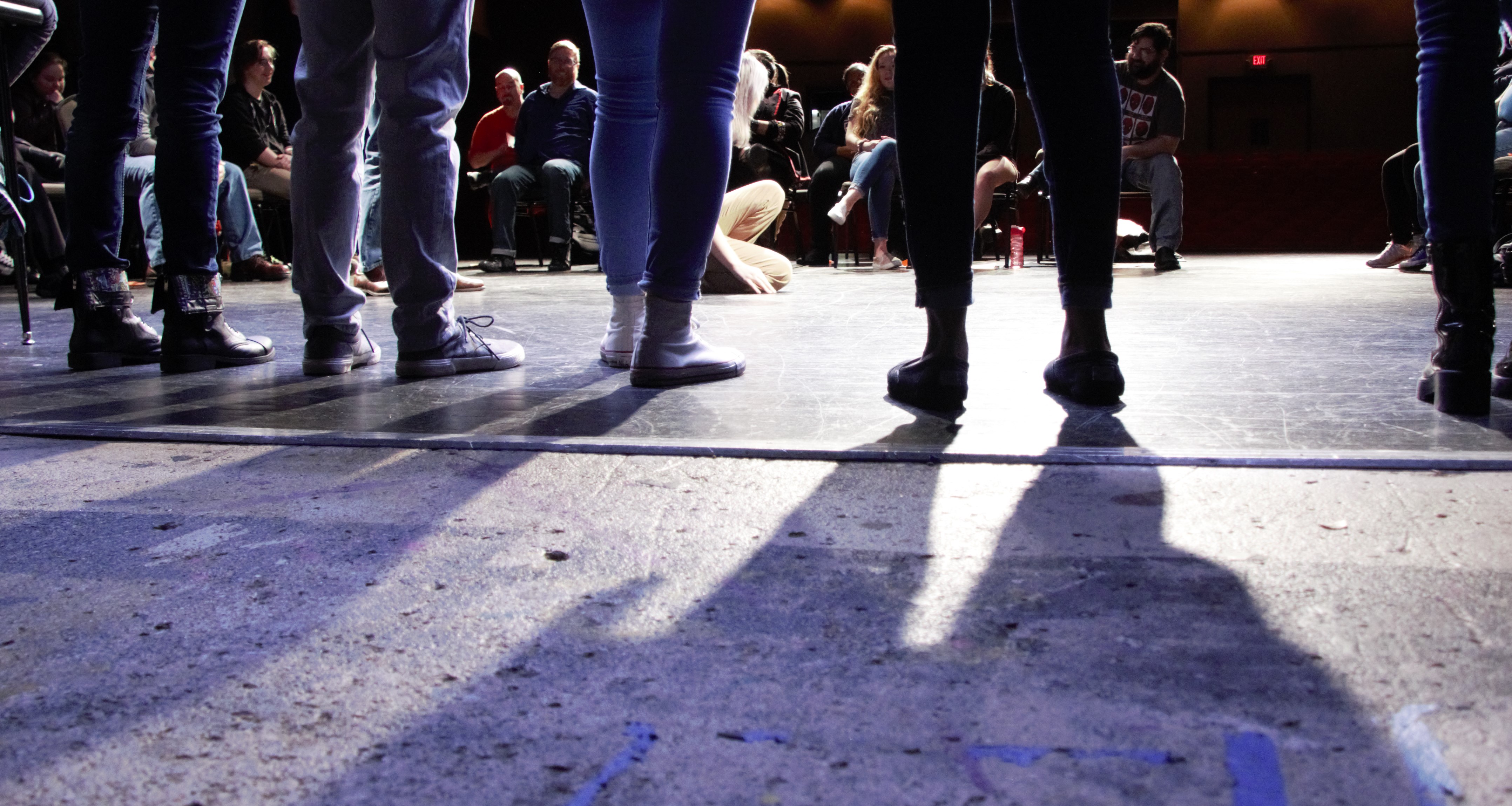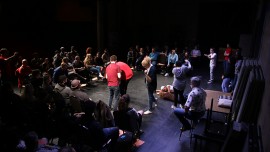‘Theatre of the Oppressed’ Addresses Tough Issues

It was a painful secret he kept for 10 years, from the time he was 14, until now.
“I didn’t say anything about what my stepdad did to me for good reason too because I just, just didn’t want to be another case of sexual misconduct that got dismissed by the legal system,” Ford Filson said.
This was how Filson, 24, spoke about his experiences of sporadic sexual misconduct.
He took a while before he looked back at the camera. He paused the interview again, reaching for a glass of water.“The first time he asked me to take off my clothes and expose myself, then he asked me to give him oral pleasure. Later he tried to bond with me, passing it off as a friendly behavior,” Filson said.
His step dad’s conduct had petrified him, he was afraid to even talk to his mom about how he was treated. He said he felt it was an issue that could break the family apart.
According to the National Center for Victims of Crime, one in five girls and one in twenty boys are victims of childhood sexual abuse. The research states 28 percent of U.S. youths ages 14 to 17 had been sexually victimized.
Data covering the forcible rape rate per 100,000 inhabitants in the United States in 2016, by state, ranked Oklahoma 11 on the list, with 52 reported victims. However, many cases like Ford’s, stay unreported.
Often times, guilt, shame, and fear of causing a family issue terminates their courage to speak out.
For Filson, the internal conflict was painful. On the verge of drowning in destructive mental depression, he found a way to free himself from the psychological oppression. He did it through Theater of the Oppressed. This Spring, the Oklahoma City Community College Theater Arts Department is organizing “Theater of the Oppressed.” With no entry fee, the production expects to portray different forms of oppression in our current society.
The concept came from Brazil, in the 1970s Augusto Boal, a theater director and playwright, initiated a new form of theatre called the “Theater of the Oppressed.”
“He was working in and around the provinces and states in Brazil and found out that in traditional theater people didn’t have the access to the creative process,” said Brent Noel, director of Theater Arts at OCCC. “As a spectator, they would either accept or reject but they couldn’t change what’s happening in a scenario. So, he said that kind of theater is contrary to the fact that it is oppression as well! Since one group talks and the other group listens.”
Those were the reasons Boal created the concept, Noel said. “Theater of the Oppressed” doesn’t portray a Greek tragedy or a tale of romance. Its unique style of depicting social and political issues gives opportunity for the audience members to participate and engage in a dialogue. Often that results in a possible solution to those scenarios.
“The oppressor’s point of view is always – let’s keep how things are, bring no change to it, it’s working very well,” Noel said. “We were all kids once upon a time and we all have made beliefs, we used to pretend and there was always a sense of freedom and reality in that. Just by having your ideas and voices heard, there is a certain amount of humanity you regain, being able to say this is how I see the world.”
Brady Rangel, a student at OCCC and one of the actors of the theater production, said his diverse life has often caused him to connect with both the oppressor and the oppressed.
“I have been on both sides, I did mix with a group that could easily be considered as a bully, but after a couple of years I was being bullied,” he said. For Rangel, putting himself in the shoes of both the oppressor and the oppressed allows him to discover more ways of coming to a solution.
The idea involves various forms of theater exercises that often carry the show toward certain oppression stories which then initiates a dialogue. The exercises, at the start of the show, also requires audience participation. And often such involvement may reveal someone’s bias towards a certain scenario.
“It is important to the theater since it clarifies how we see the world,” Noel said. “It is always up to the audience to decide what we shouldn’t be saying and here is what it means. It should be asking a question ‘what does it mean to you?’ That becomes an opportunity to give the audience empowerment.”
Ahmed Jasim is a former broadcasting major from OCCC. To him oppression, such as sexual misconduct or domestic violence, is considered to be pretty common in households across the Middle East. He was born and brought up in Qatar, one of the wealthiest countries in the Middle Eastern world.
“There were four of them including a family friend,” he said. “Often one of them would take me to the middle of nowhere and rape me at the back seat of their truck. I was too young to protest and too prettified to share it with my parents.”
Jasim was only 13 when he was raped the first time. The assaults kept happening for next couple of years, before his family shifted to a new neighborhood. His attackers blackmailed him using mischief he had caused in the neighborhood.
“I haven’t shared it with anyone yet, none of my family members yet know that our neighbors raped me day and night. I felt my family would be off casted or maybe I won’t be allowed in the society anymore,” he said. Tanvir, who asked the Pioneer to change his name, was sexually assaulted by his priest when he was eight years old. Tanvir is from Bangladesh, a country in Southeast Asia.
For his family, the priest was a blessing, and no one believed Tanvir. “It’s hard to talk to people in a third world about such assaults because

either they get buried because the society won’t believe, or it’s the sense of shame that prevents you from going up to your guardians and talk about such issues,” he said Such oppression is an epidemic in the Eastern world, Ahmed Jasim believes.
To him there isn’t a proper solution to such situations, except for going through psychology treatment or filing a case. “Often the cases are dropped by the local police or the medical treatments are super expensive to even consider as an option,” Jasim said.
Kat Adams is a theater major at OCCC and is one of the performers from the production. Kat was victimized by her ex-boyfriend and his friend, “I woke up and found that he had his hand inside my pants, I freaked out. For a longtime I didn’t understand that it really was an oppression, until the rehearsals for the ‘Theater of the Oppressed’ began,” Adams said.
The rehearsal process involves different discussion sessions, involving performers sharing their stories of oppression. “When I saw there were more victims like me, I understood that I was molested too,” Adams said. Noel said the production asks questions such as how do we engage in dialogue? How to engage in a discussion? Not necessarily solve them but just come together and see things together.
“You may have different viewpoints then me, but just listening to you gives me access to know your viewpoint and your humanity better,” Noel said. “Such discussions and dialogue could be an approach towards fixing situations that often society overlooks.”
For Ford Filson, the whole month of rehearsing for the show has been therapeutic. Being among people who have also experienced similar oppression, has allowed him to feel free.
“It helps me to be more open and brave,” he said. For Noel the performances are chance to bring meaning to what he calls a senseless word. “How can we come together and discover that with dialogue, should be the goal,” he said.
[ngg_images source=”galleries” container_ids=”79″ display_type=”photocrati-nextgen_basic_slideshow” gallery_width=”600″ gallery_height=”400″ cycle_effect=”fade” cycle_interval=”10″ show_thumbnail_link=”0″ thumbnail_link_text=”[Show thumbnails]” order_by=”sortorder” order_direction=”ASC” returns=”included” maximum_entity_count=”500″]